Abstract
Two groups, each of 21 cases of severe blunt head injury, were compared. Patients in one group were pursuing claims for financial compensation while patients in the other were not. Patients were assessed on cognitive tests, and both patients and relatives were interviewed at 3, 6 and 12 months after injury. There were few differences between claimants and non-claimants: post-concussional symptoms were common in both, cognitive performance was equal, and the reports given by relatives of changes in the patients were very similar. However, the reports given by patients themselves differed with claimants reporting slightly more symptoms than non-claimants.
Full text
PDF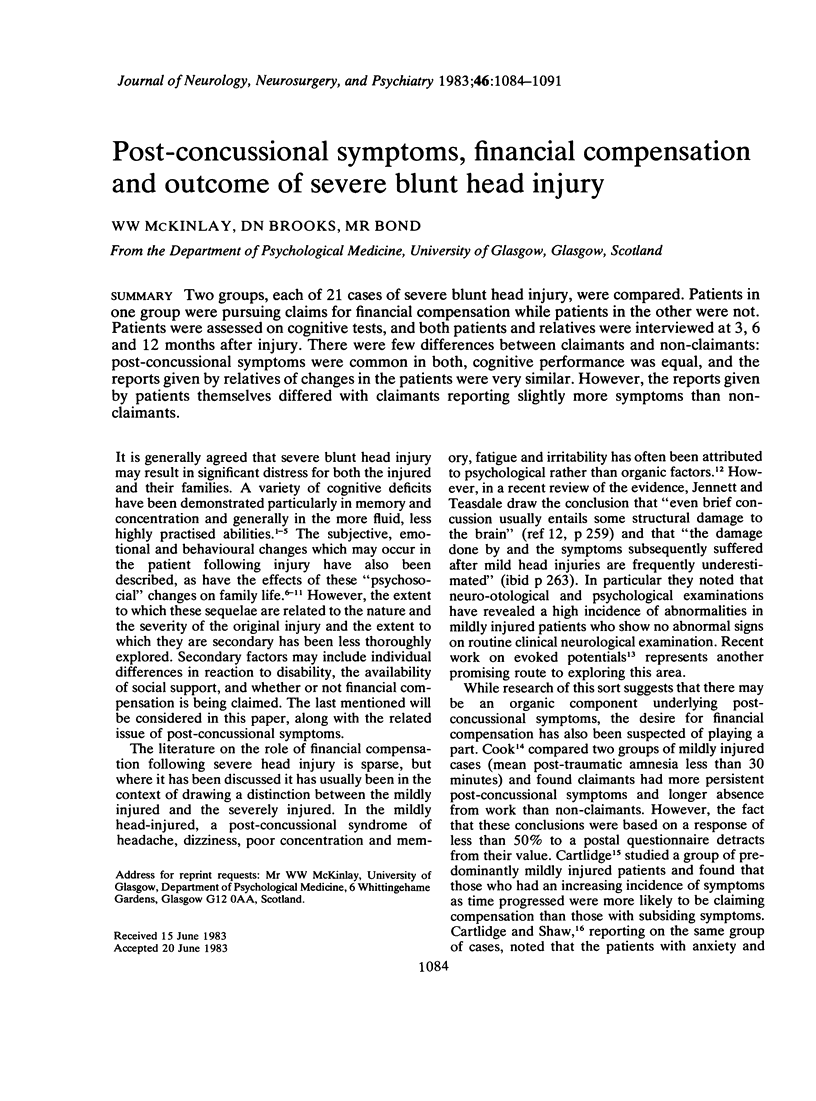
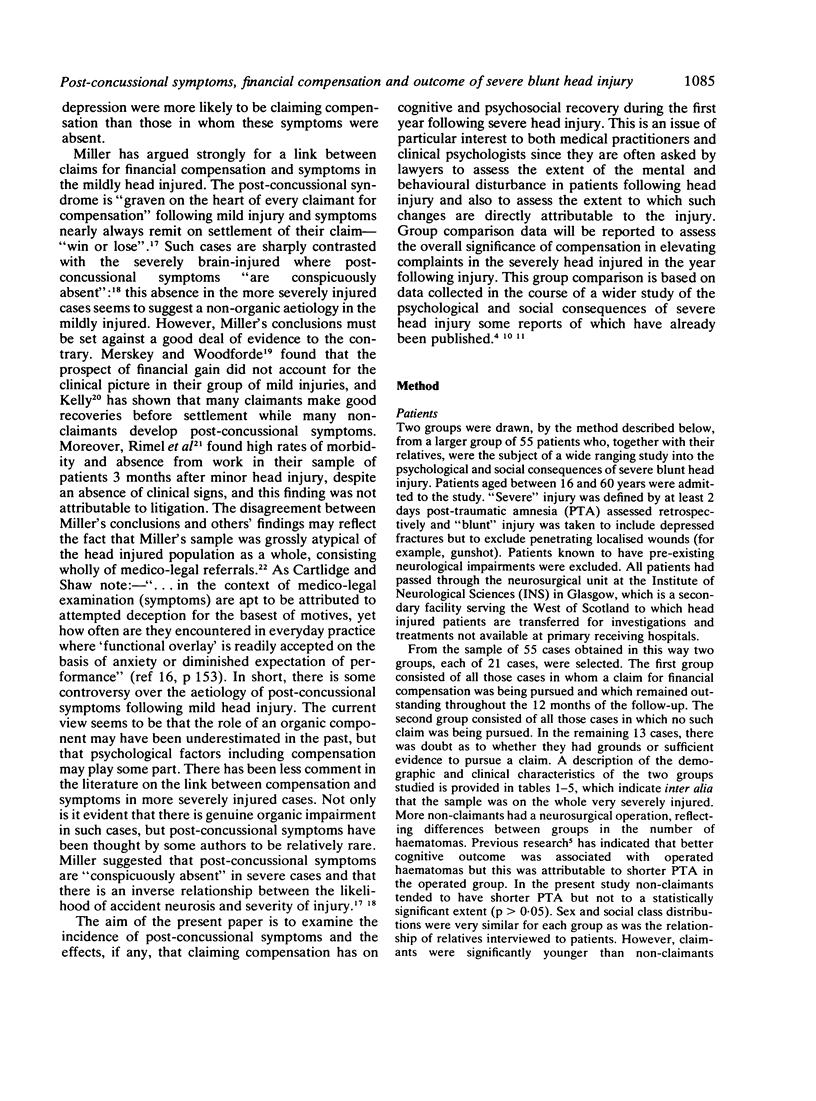
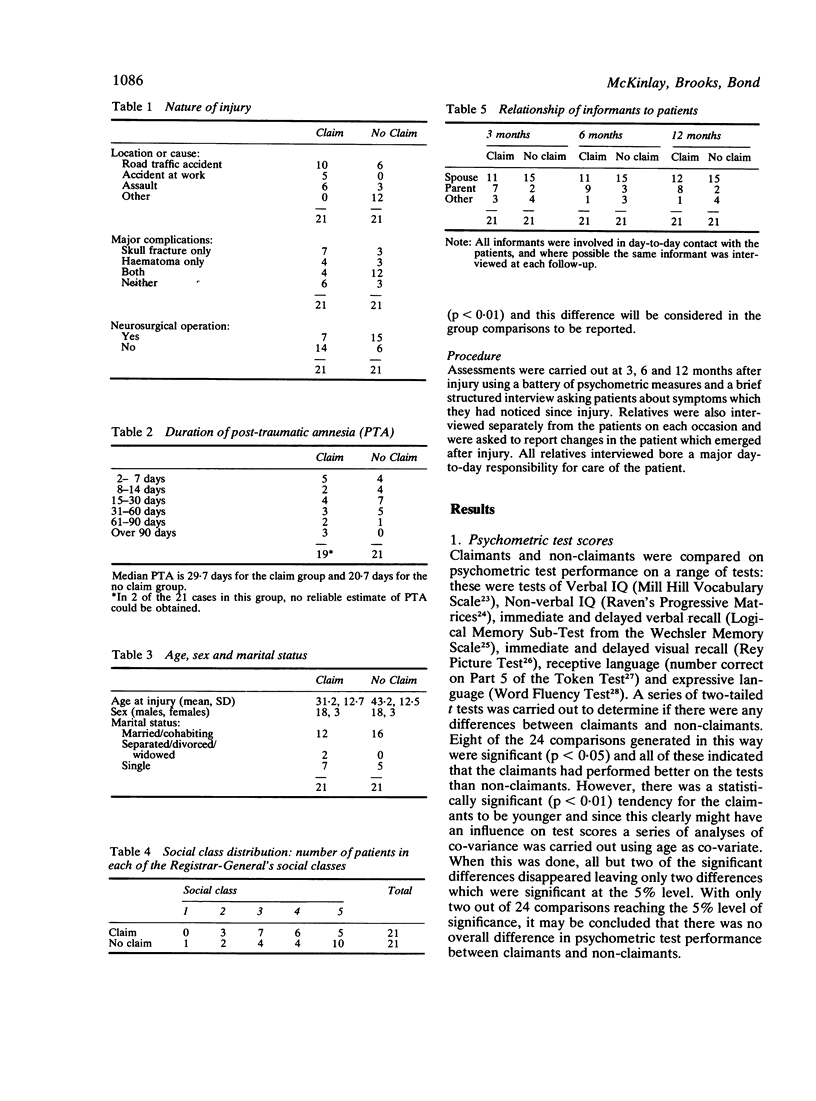
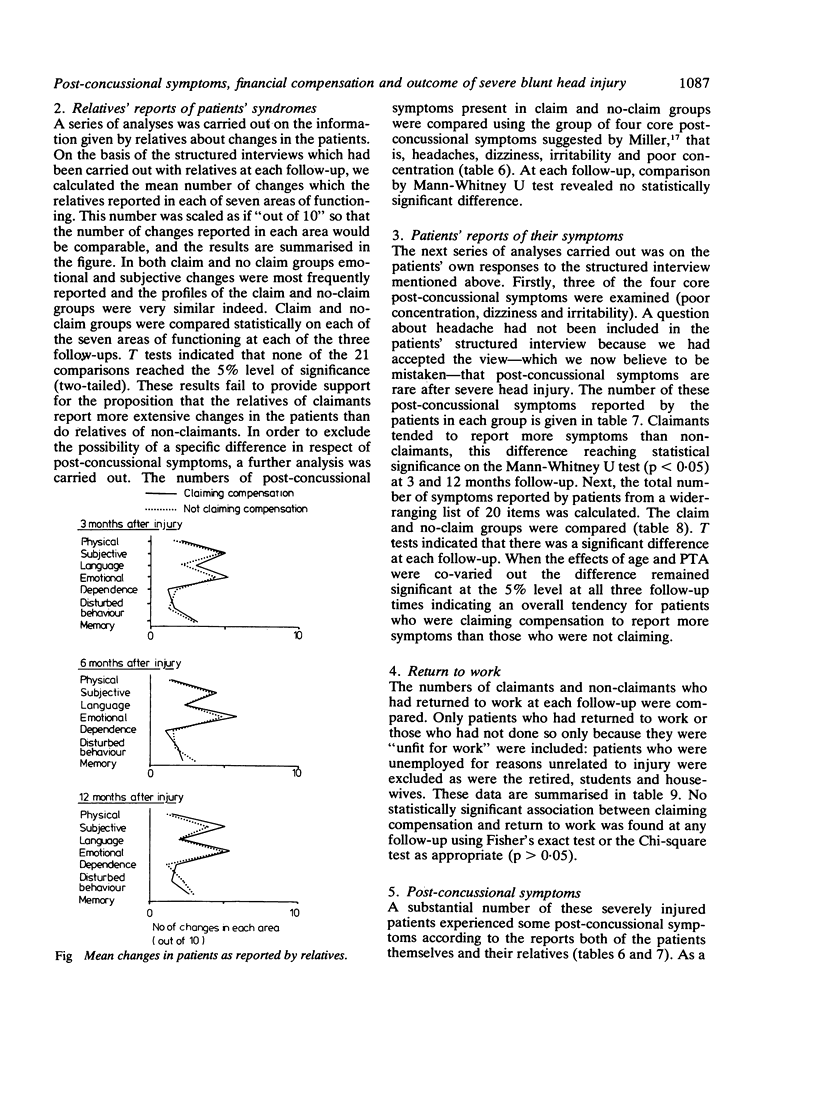
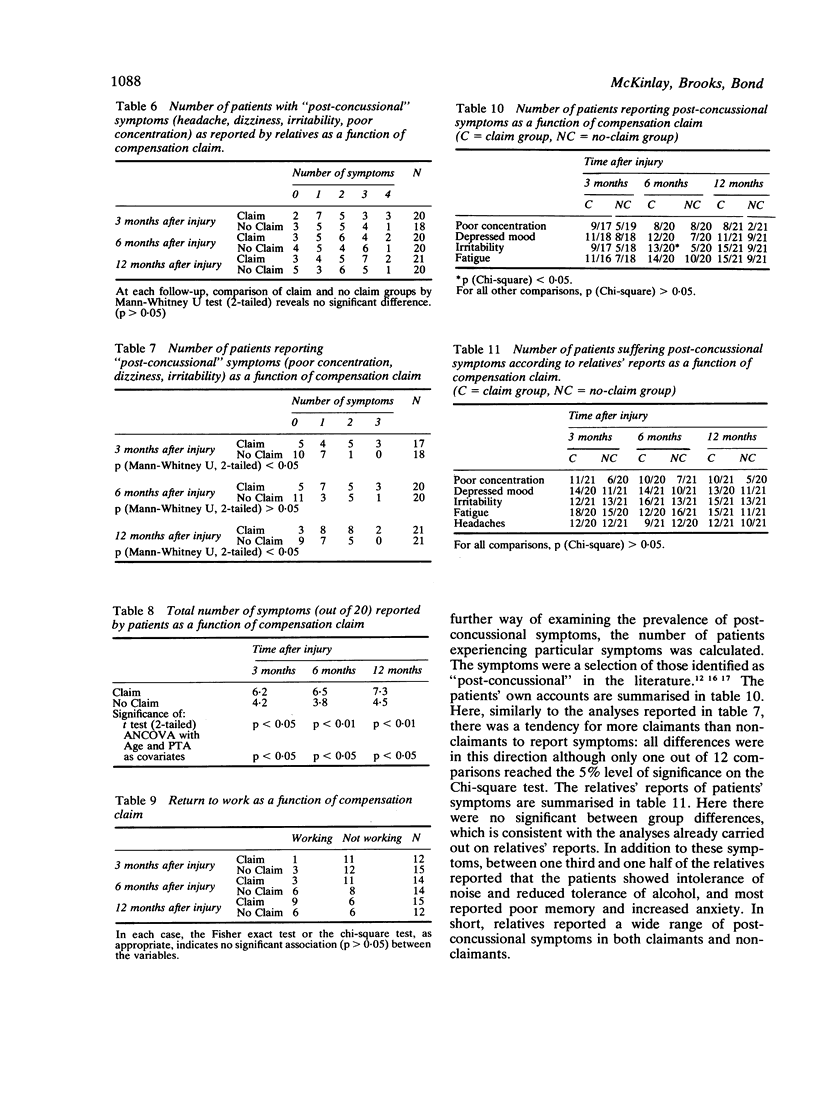
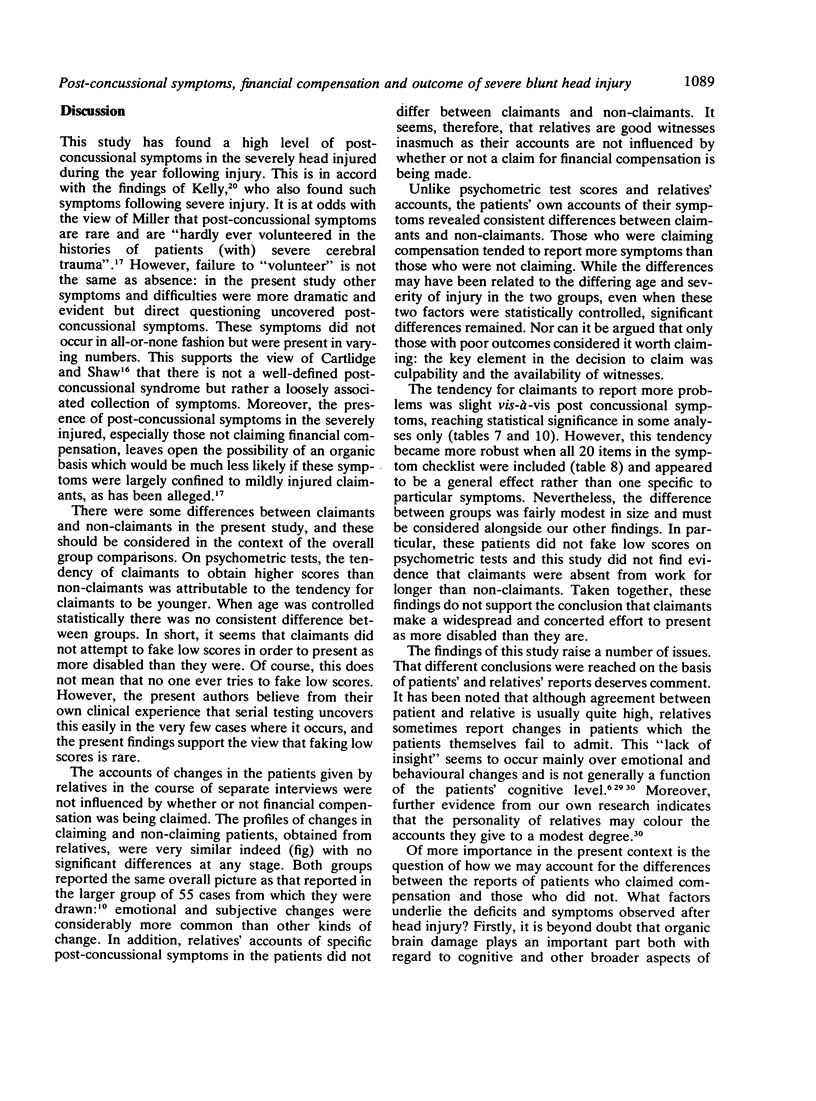
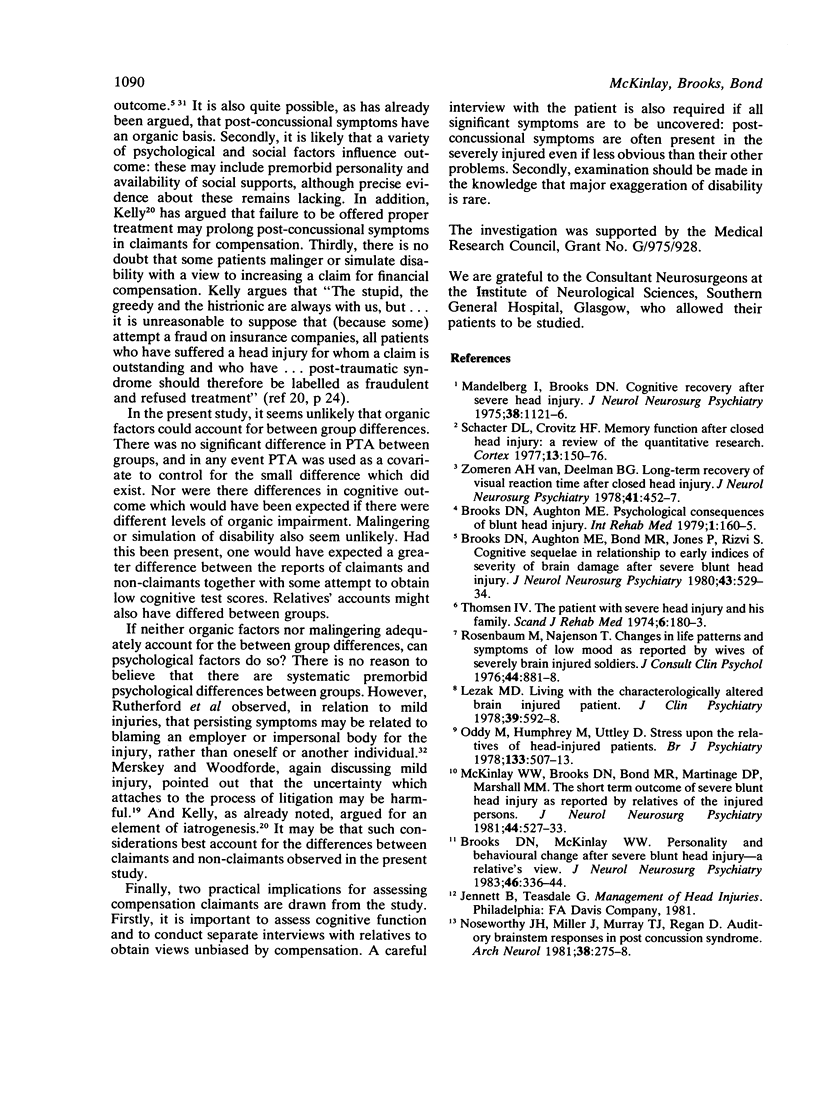
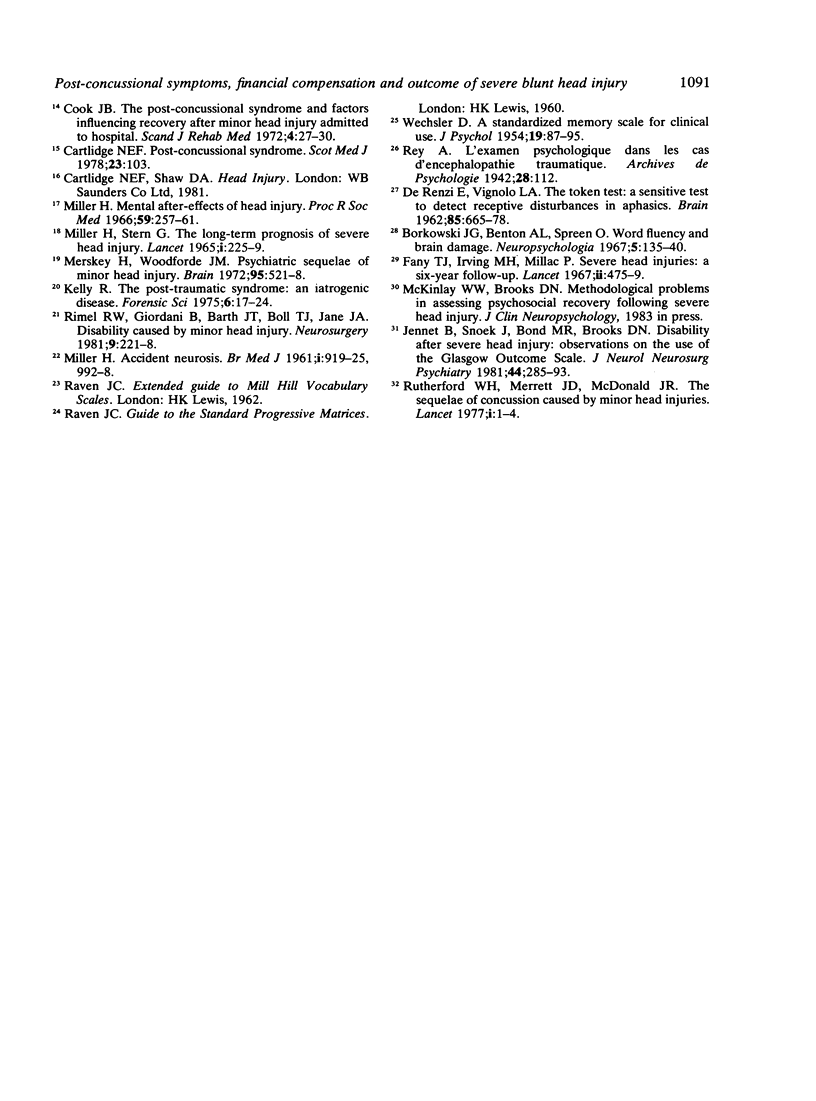
Selected References
These references are in PubMed. This may not be the complete list of references from this article.
- Brooks D. N., Aughton M. E., Bond M. R., Jones P., Rizvi S. Cognitive sequelae in relationship to early indices of severity of brain damage after severe blunt head injury. J Neurol Neurosurg Psychiatry. 1980 Jun;43(6):529–534. doi: 10.1136/jnnp.43.6.529. [DOI] [PMC free article] [PubMed] [Google Scholar]
- Brooks D. N., Aughton M. E. Psychological consequences of blunt head injury. Int Rehabil Med. 1979;1(4):160–165. doi: 10.3109/03790797909164037. [DOI] [PubMed] [Google Scholar]
- Brooks D. N., McKinlay W. Personality and behavioural change after severe blunt head injury--a relative's view. J Neurol Neurosurg Psychiatry. 1983 Apr;46(4):336–344. doi: 10.1136/jnnp.46.4.336. [DOI] [PMC free article] [PubMed] [Google Scholar]
- Cartlidge N. E. Post-concussional syndrome. Scott Med J. 1978 Jan;23(1):103–103. doi: 10.1177/003693307802300146. [DOI] [PubMed] [Google Scholar]
- Cook J. B. The post-concussional syndrome and factors influencing recovery after minor head injury admitted to hospital. Scand J Rehabil Med. 1972;4(1):27–30. [PubMed] [Google Scholar]
- DE RENZI E., VIGNOLO L. A. The token test: A sensitive test to detect receptive disturbances in aphasics. Brain. 1962 Dec;85:665–678. doi: 10.1093/brain/85.4.665. [DOI] [PubMed] [Google Scholar]
- Fahy T. J., Irving M. H., Millac P. Severe head injuries. A six-year follow-up. Lancet. 1967 Sep 2;2(7514):475–479. doi: 10.1016/s0140-6736(67)91650-9. [DOI] [PubMed] [Google Scholar]
- Jennett B., Snoek J., Bond M. R., Brooks N. Disability after severe head injury: observations on the use of the Glasgow Outcome Scale. J Neurol Neurosurg Psychiatry. 1981 Apr;44(4):285–293. doi: 10.1136/jnnp.44.4.285. [DOI] [PMC free article] [PubMed] [Google Scholar]
- Kelly R. The post-traumatic syndrome: an iatrogenic disease. Forensic Sci. 1975 Aug-Oct;6(1-2):17–24. doi: 10.1016/0300-9432(75)90219-8. [DOI] [PubMed] [Google Scholar]
- Lezak M. D. Living with the characterologically altered brain injured patient. J Clin Psychiatry. 1978 Jul;39(7):592–598. [PubMed] [Google Scholar]
- MILLER H. Accident neurosis. Br Med J. 1961 Apr 1;1(5230):919–925. doi: 10.1136/bmj.1.5230.919. [DOI] [PMC free article] [PubMed] [Google Scholar]
- MILLER H., STERN G. THE LONG-TERM PROGNOSIS OF SEVERE HEAD INJURY. Lancet. 1965 Jan 30;1(7379):225–229. doi: 10.1016/s0140-6736(65)91519-9. [DOI] [PubMed] [Google Scholar]
- Mandleberg I. A., Brooks D. N. Cognitive recovery after severe head injury. 1. Serial testing on the Wechsler Adult Intelligence Scale. J Neurol Neurosurg Psychiatry. 1975 Nov;38(11):1121–1126. doi: 10.1136/jnnp.38.11.1121. [DOI] [PMC free article] [PubMed] [Google Scholar]
- McKinlay W. W., Brooks D. N., Bond M. R., Martinage D. P., Marshall M. M. The short-term outcome of severe blunt head injury as reported by relatives of the injured persons. J Neurol Neurosurg Psychiatry. 1981 Jun;44(6):527–533. doi: 10.1136/jnnp.44.6.527. [DOI] [PMC free article] [PubMed] [Google Scholar]
- Merskey H., Woodforde J. M. Psychiatric sequelae of minor head injury. Brain. 1972;95(3):521–528. doi: 10.1093/brain/95.3.521. [DOI] [PubMed] [Google Scholar]
- Miller H. Mental after-effects of head injury. Proc R Soc Med. 1966 Mar;59(3):257–261. [PMC free article] [PubMed] [Google Scholar]
- Noseworthy J. H., Miller J., Murray T. J., Regan D. Auditory brainstem responses in postconcussion syndrome. Arch Neurol. 1981 May;38(5):275–278. doi: 10.1001/archneur.1981.00510050041004. [DOI] [PubMed] [Google Scholar]
- Oddy M., Humphrey M., Uttley D. Stresses upon the relatives of head-injured patients. Br J Psychiatry. 1978 Dec;133:507–513. doi: 10.1192/bjp.133.6.507. [DOI] [PubMed] [Google Scholar]
- Rimel R. W., Giordani B., Barth J. T., Boll T. J., Jane J. A. Disability caused by minor head injury. Neurosurgery. 1981 Sep;9(3):221–228. [PubMed] [Google Scholar]
- Rosenbaum M., Najenson T. Changes in life patterns and symptoms of low mood as reported by wives of severly brain-injured soldiers. J Consult Clin Psychol. 1976 Dec;44(6):881–888. doi: 10.1037//0022-006x.44.6.881. [DOI] [PubMed] [Google Scholar]
- Rutherford W. H. Sequelae of concussion caused by minor head injuries. Lancet. 1977 Jan 1;1(8001):1–4. doi: 10.1016/s0140-6736(77)91649-x. [DOI] [PubMed] [Google Scholar]
- Schacter D. L., Crovitz H. F. Memory function after closed head injury: a review of the quantitative research. Cortex. 1977 Jun;13(2):150–176. doi: 10.1016/s0010-9452(77)80006-3. [DOI] [PubMed] [Google Scholar]
- Thomsen I. V. The patient with severe head injury and his family. A follow-up study of 50 patients. Scand J Rehabil Med. 1974;6(4):180–183. [PubMed] [Google Scholar]
- Van Zomeren A. H., Deelman B. G. Long-term recovery of visual reaction time after closed head injury. J Neurol Neurosurg Psychiatry. 1978 May;41(5):452–457. doi: 10.1136/jnnp.41.5.452. [DOI] [PMC free article] [PubMed] [Google Scholar]


